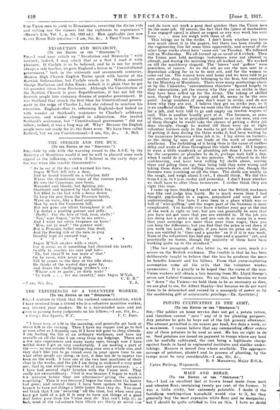REVOLUTION AND MONARCHY.
[TO THE EDITOR OF THE " SPECTATOR."]
read your article on " Revolution and Monarchy " with interest; indeed, I may admit that as a Scot I read it with pleasure. if Carlyle is to be believed, and he is not for youth always a safe teacher, we gave England a lesson in " Constitutional government," both in the sixteenth and seventeenth centuries. Modern High Church English Tories speak with horror of the Scottish Reformation, but Carlyle revels in it. Milton admired George Buchanan and John Knox; indeed, it is plain that he got his grandest ideas from Buchanan. Although the Constitution of the Scottish Church is pure Republicanism, it has not led the Scottish people into visionary dreams of popular government. It was Scotland that struck the first blow for Constitutional govern- ment in the reign of Charles I., but she refused to sanction his execution. England—that is, reforming England—had looked on with wonder at Scotland's resistance to Charles's arbitrary measures, and wonder changed to admiration. She invited Scotland's assistance, but " Constitutional government " did not follow; indeed, it was a long way off. Why? Because the English people were not ready for it; the Scots were. We have been called
Radical, but we are Constitutional.—I am, Sir, &c., A. McI.


























 Previous page
Previous page